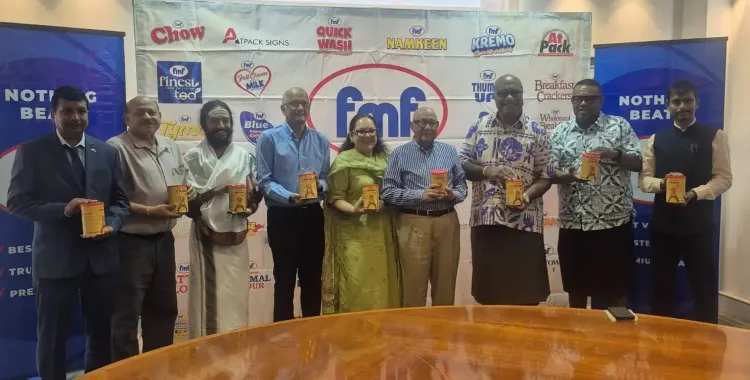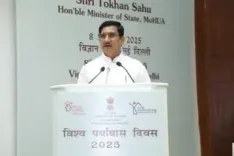Could the Launch of Made-in-India Amul Ghee in Fiji Strengthen Bilateral Relations?

Synopsis
Key Takeaways
- Made-in-India Amul Ghee launched in Fiji, enhancing culinary heritage.
- Strengthening economic ties between India and Fiji.
- Focus on supporting local farmers and communities.
- Promotion of healthier food choices through quality products.
- Adoption of digital technologies in agriculture for better market access.
Suva, Oct 8 (NationPress) In a noteworthy development for the trade and cultural ties between India and Fiji, FMF Foods has officially unveiled the Made-in-India Amul Cow Ghee in Fiji. This launch symbolizes a celebration of both culinary traditions and economic collaboration.
The event is viewed as a significant enhancement to local food markets and signifies the deepening partnership between the two countries, particularly embodying the spirit of community development and mutual assistance, known locally as Veilomani Dosti.
The Indian High Commission in Suva marked this historic occasion on X, expressing: "A historic milestone with the launch of #MadeInIndia Amul Ghee in Fiji. Congratulations to @FMFFoods for organizing this event, showcasing the robust and evolving partnership in the spirit of Veilomani Dosti. Chief Guest, @FijiGovernment Deputy Prime Minister and Minister for Trade and Communications Hon. @KamikamicaManoa, commended the achievements of India’s cooperative sector. Mr. Pradeep Menon, Second Secretary, represented @HCI_Suva at the event."
This product has been introduced in Fiji through a collaborative effort between FMF Foods and Amul India, with the goal of delivering the rich, authentic taste of Indian ghee to Fijian homes. The launch not only advocates for healthier food options but also reinforces the connections between the people and businesses of India and Fiji.
In media interactions, Pradeep Menon, Second Secretary (Consular and Commerce) at the Indian High Commission in Suva, emphasized the transparency and quality assurance that go into the production of Amul ghee.
Menon explained that milk is sourced from rural areas, rigorously tested, and then processed under stringent standards to ensure it is safe and hygienic for consumption.
He assured consumers that the product is completely natural and free from chemicals, demonstrating Amul's unwavering dedication to quality and public health.
The Chief Guest, Deputy Prime Minister and Minister for Trade and Communications Manoa Kamikamica, lauded India's cooperative initiatives, particularly the Amul model, for its beneficial effects on rural economies.
Kamikamica highlighted the importance of scaling these initiatives by linking small farmers to larger markets, which would enhance their earnings and retain value within local communities.
He shared insights from his visit to Gujarat, India, last year, where he witnessed the incorporation of digital technology into Amul's supply chain. He noted that farmers receive real-time updates on milk prices and quality through mobile applications, a model that Fiji aspires to adopt to empower its own dairy industry.









